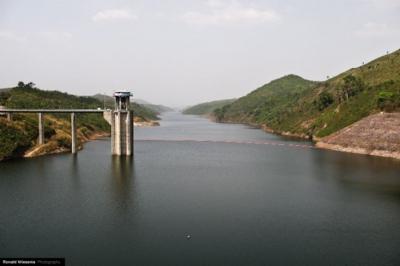Seasonality and Trade in Hydro-Heavy Electricity Markets: the West Africa Power Pool
Hydropower is an important source of electricity, with many regions expanding their capacity to meet growing energy needs. As a dispatchable non-fossil energy source, hydropower, may play an increasingly important role in future energy system transitions. However, hydropower generation is affected by seasonal patterns in precipitation, such as monsoons. Many integrated land-water-energy studies ignore this seasonality, which can mask important multisector dynamics and dependencies. This study highlights the importance of considering regional power system integration and seasonality in a case study in West Africa. The results show that greater power systems integration between West African nations could reduce the cost of meeting future energy demands, but that ignoring hydropower seasonality misrepresents the flow of power and potential dependencies among nations.
Hydropower has historically been an important source of electricity as a non-fossil and dispatchable energy source and it is expected to grow as nations look to transition toward lower-carbon energy systems. To navigate emerging multi-sector challenges, including climate change, water scarcity, and demographic and technology change, it is crucial that scientists improve the fidelity of power systems modeling by better capturing key systems features, like hydropower seasonality. This work will inform future modeling efforts in all regions of the globe where hydropower is prominent by illustrating the importance of incorporating seasonality and cross-border energy trade to improve the understanding of the dynamics of hydropower within the larger electric system.
Hydropower is an important source of electricity that is heavily impacted by seasonal weather patterns, which can affect seasonal energy generation mixes and cross-region trade. Understanding the multi-sector implications of seasonality in regions with significant hydropower generation is important to properly characterize risks, vulnerabilities, and opportunities under alternative scenarios of trade and other demand drivers. Researchers selected West Africa as a testbed for this study as West Africa receives about 25 percent of its electricity from hydropower annually but is heavily impacted by the monsoon cycle that alters generation mixes and the flow of energy between nations seasonally. Ignoring the seasonality risks misrepresenting important regional cross-sector dependencies. To address this, researchers linked the global hydrologic model Xanthos with a capacity West Africa expansion power trade model. The integrated modeling framework allowed researchers to explore the consequences of energy system integration between West African nations and of ignoring seasonality. The researchers found that transitioning from the rainy to dry season decreases hydroelectricity generation by an average of 40 percent in a typical year and that greater system integration between nations has the potential to decrease the costs of meeting future energy demands. The study showed that ignoring hydropower seasonality misrepresents the seasonal flow of power and key dependencies between West African nations—a finding that provides insights to all regions of the globe where hydroelectric potential is important.

